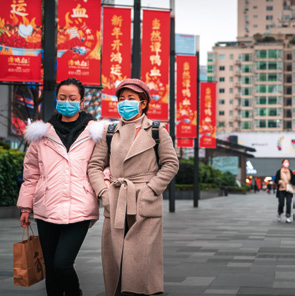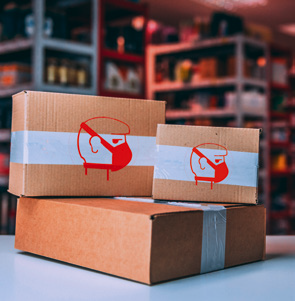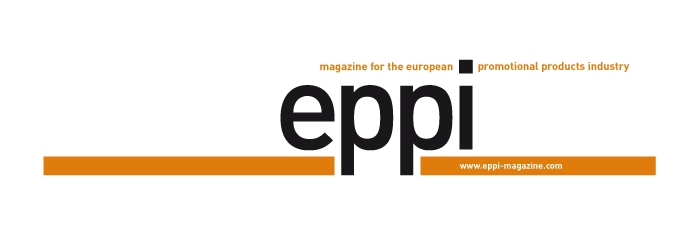The Corona crisis is having an unprecedented impact on the international promotional products industry. Many of the players are talking about the most difficult times they have ever experienced. The fear is tangible: of the virus, but also of the economy plunging into a recession. The extensive shutdown in large parts of Europe has brought cities to a standstill, however there is no sign of this tranquility in the world of business. On the contrary: The suppliers and distributors have to adapt to new conditions on a daily, almost hourly basis, they are continually faced with new challenges. This makes the attempt to provide current status reports almost impossible. As an industry information service provider, eppi magazine has nevertheless endeavoured to capture a representative view of the mood. The published statements were approved for release between March 31 and April 6, 2020. The following analysis primarily focuses on the situation in the Far East and the import business, for which the impact of the Corona crisis is more readily assessable.

John Ironmonger is a graduate zoologist, an international IT expert and passionate author. However, the British academic also seems to dispose of prophetic powers: Namely, in 2015, he published a novel entitled Not forgetting the Whale, which is frighteningly topical in the wake of the Corona crisis. The book is set in a remote coastal village in England, which falls into chaos like the rest of the world when a new type of virus pathogens from Indonesia spreads across the globe like wildfire and claims countless lives. The village isolates itself off, the protagonist Joe – a banker from London – organises XXL stocks of supplies from the surrounding wholesale stores and stacks the goods up in the village’s church tower, the stock exchanges crash, the economy comes to a standstill, the connections to the outside world are cut off in order to contain the infection rate. So much for the fiction. And the reality in the year 2020? It is astonishingly similar. Except for the fact it feels totally different when one is catapulted into the midst of the “most difficult situation since 1945” (Angela Merkel) in flesh, when it suddenly comes down to engaging in the “war” against the virus (Emmanuel Macron), instead of sitting on the couch in comfort reading about it in a scary novel. The Corona crisis is captivating everyone, turning us all into affected persons, indeed players. And even if the political rhetoric is overexaggerated here and there, if the continual whispering and warnings tend to have a more damaging and above all unsettling effect on sensitive minds – the fact cannot be denied that the current situation we find ourselves in is incomparable. There have indeed been much worse catastrophes in the history of mankind, but up until this very day the world hasn’t experienced a global standstill as the result of a pandemic. This is what makes it so difficult to evaluate the crisis, there is no blueprint that serves as orientation.
From Wuhan to the corners of the globe
 In Ironmonger’s novel the pandemic breaks out in Indonesia, in the real world it occurred in China, to be more precise in the meanwhile famous city with a population of eleven mil. people, Wuhan, in the Chinese province Hubei. The global public first took note of the epidemic that was spreading through China in January 2020, however the first cases were actually described at the end of December 2019, which is why the name of the virus is COVID-19 (an abbreviation for corona virus disease 2019). At first, many Europeans thought the disease was a question of a Chinese, in the worst case Asiatic problem – similar to the SARS epidemic in 2003 – especially since the causative Corona virus strains (SARS-CoV and SARS-CoV-2) appear to be closely related. At the time, the biggest concern was the import business and a possible downturn in China’s economy.
In Ironmonger’s novel the pandemic breaks out in Indonesia, in the real world it occurred in China, to be more precise in the meanwhile famous city with a population of eleven mil. people, Wuhan, in the Chinese province Hubei. The global public first took note of the epidemic that was spreading through China in January 2020, however the first cases were actually described at the end of December 2019, which is why the name of the virus is COVID-19 (an abbreviation for corona virus disease 2019). At first, many Europeans thought the disease was a question of a Chinese, in the worst case Asiatic problem – similar to the SARS epidemic in 2003 – especially since the causative Corona virus strains (SARS-CoV and SARS-CoV-2) appear to be closely related. At the time, the biggest concern was the import business and a possible downturn in China’s economy.
Two months later these problems almost appear ridiculous compared with the challenges we are faced with since the SARS-CoV-2 pathogens have found their way across Europe via Italy. And yet the outbreak of COVID-19 in China indeed brought the promotional products industry huge challenges and has left significant traces behind. Wuhan and the surrounding province Hubei are one of the important production centres of the country. Car manufacturers like Nissan or Honda have large factories here, this is where important components for the high-tech industry are produced, but also where products for the promotional products industry are made. In any case, the crisis that began in Wuhan soon became noticeable across the entire country – above all because the Chinese Government pursued a strict containment policy and “ordered the people to stay at home so that life came to a standstill in many cities” (Hendrik Boeing, Brandcraft). In mid-February, around three weeks after the Chinese New Year, the New York Times reported that at least 750 million people were under quarantine in the Chinese provinces and large cities. Furthermore civil servants and public sector employees were obliged to act as so-called “volunteers in the combat against the Corona virus”. The factories were consequently empty, the compulsive break lasted around six weeks in total according to the estimations of import companies. Often production couldn’t even commence at those factories the employees had returned to, because the necessary equipment – in particular face masks – were missing. Experienced importers always anticipate delivery delays around the Chinese New Year and stock up accordingly beforehand, so that at the beginning we “were able to cushion any of the few delays that arose as a result of the situation” (Nils Fior, Vonmählen). However, nobody had reckoned with such long downtimes. “No importer could have possibly been prepared for this situation” (Klaus Ritzer, Verticas). The project business situation that is often coupled with deadlines proved even more problematic. Many orders had to be cancelled, individual agreements had to be reached with each customer.
The situation in China has in the meantime calmed down somewhat, “the climax of the crisis already seems to have been overcome” (Aneta Niciak, Refloactive). Many workers have been able to return to their factories, the import offices on the mainland and in Hong Kong have been reachable for some time again at least via home offices. On March 24, the lockdown of the Hubei Province was lifted, whether the suspension of the ban on travelling to the metropolitan city announced for April 8, was actually enforced, was not known by the time of going to press. In other provinces the quarantine regulations were relaxed earlier so that the factories are slowly filling up again. “We are utilising approx. 50% of our actual production capacity and we are gradually working our way back towards full capacity” (Fior). “Currently around 90% of our suppliers are working again,” Wolfgang Bosch, Mitraco, also confirmed. Yet, frictional losses are being recorded, the upstream suppliers are often still not available, for example the umbrella manufacturer may be able to take up work again, but he hasn’t got any handles. “All of the supply chains, especially also the supply stage, were thrown into disarray” (Ritzer).
Logistics problems
Even if the overall situation in China has been improving faster than expected since mid-March, the otherwise well-oiled logistics cogs are grinding much more slowly than before, the Chinese domestic transport sector is for instance still extremely incapacitated. “One problem is actually getting the goods to the harbour” (Ritzer). But even once they have reached the port, there is still a long way to go before they have actually left the country. Whereas varied experiences are being made regarding the processing of the customs formalities and the availability of the customs officers, the import companies are unanimous about the fact that there is a huge bottleneck regarding air and sea freight. “Some of the big players have blocked huge capacities, due to the mass cancellations of passenger flights, further freight capacities have been lost” (Marcus Sperber, elasto). In consequence the freight prices are rocketing sky high, “an increase of 300% to 400% is normal and not representable for most of the customers” (Ritzer). It is impossible to visit production facilities at the moment, most of the industry players have also postponed participating at trade shows in the Far East until the autumn too. Whereas a new date has still not been set for the Canton Fair, which was originally scheduled to take place in April, the Hong Kong Gifts and Premium Fair is now going to be staged in mid-July. This is too early for many importers, because they are assuming there is going to be a delay in innovations due to the situation in China. They are asking themselves: who has had the time to develop new products at present? And which products could they include? One thing seems certain: The Corona crisis has also shaken up the need for items. If there are any enquiries for items currently, these are for protective equipment, care products and foodstuffs.
As if all of this wasn’t enough, the industry has also got to defend itself against prejudices: Since the outbreak of COVID-19, the general suspicion of some of the consumers, but also of some industry buyers is that Chinese goods are contaminated with the virus. In spite of the fact that statements from official authorities have long since confirmed that the virus cannot survive the long transport route from the Far East. Furthermore, it is still not clear whether the virus can spread by surface contact at all and whether it remains infectious on surfaces. However, this Corona Crisis 63 isn’t calming people down whatsoever. Diseases fuel fear, emotionalise the discussions and lead to irrational behaviour and attitudes.
Worldwide recession
The situation in the Far East was complicated and will remain so for some time to come. But “extended delivery times and bottlenecks are only a minor problem in comparison to other factors – the threatening worldwide recession is much worse” (Anna Ghiraldini, Cipi). Since the virus has started spreading and COVID-19 has become a pandemic, which is affecting the entire globe, the world has changed. The virus has hit Italy the worst: On April 2, the country reported 110,574 infected people and 13,155 deaths, that was almost 10,000 more deaths than in China. “The situation is extreme” (Federico Vitolo, NBL Vitolo), the “entire country has shut down and strict limitations on our movements are in place, all short-term activities have been frozen until further notice, but definitely until June or July” (Ghiraldini). The consequences for the economy are disastrous. “The Corona pandemic is going to lead to a worse crisis than the one we suffered after 2008. What we are experiencing at the moment in Italy is going to happen everywhere in Europe and in many other countries soon” (Vitolo). Vitolo’s forecast has proved to be correct at least partly. The situation in Spain is meanwhile similar to that in Italy, in other countries it appears that the measures implemented to contain the pandemic will perhaps cushion the major blow for the health system. Nevertheless, the economy has come to a standstill everywhere within the shortest space of time. The stock indices are crashing, the automobile industry is stopping production, airlines are cancelling a staggering number of flights, big tour operators are filing for government aid as a precautionary measure. The retail shops have had to close everywhere – and many won’t open again after the crisis too. Professional athletes and creative artists can no longer pursue their work, gastronomy businesses have had to close down, the existence of many of the small and micro enterprises, which traditionally make up a large share of the promotional products market’s customers, is threatened.
The cancellation of all trade shows is also problematic for the industry – because haptic advertising is implemented big-scale at trade fairs. And the sales promoting effect of the industry’s own events, a large number of which have been postponed until later in the year, is also being sorely missed. That the European borders have closed, is impeding the export business, that business trips and the related sales force visits have been axed almost completely is also complicating the communications of an industry that is characterised by “intense interactions and frequent contacts” (Ralf Oster, PF Concept). Many are saying that the Corona crisis will change the promotional products world long-term.
Everyday routine in times of crisis
But first of all, the matter at hand is mastering the current situation – in many cases from the home office. And this is difficult in spite of the government aid offered. Since the limitations on social contact that have been imposed in many European countries, the promotional products business has practically come to a standstill too, “incoming orders have really dropped” (Sperber) and “plummeted almost down to zero” (Bosch). Many companies will experience cash-flow problems, numerous suppliers and distributors have already introduced short-time work. Alongside these financial, existential worries, one has to carry on managing everyday life, organise telework, split teams in order to be well-prepared for Corona quarantine cases and much more. The Corona crisis is presenting the industry with unprecedented tasks, the topic will continue to accompany all of the market participants and will also be a prevailing theme in the coming issues of eppi magazine. The outcome is uncertain; however, the industry has frequently demonstrated that it also capable of coping well even amid adverse circumstances.
Incidentally, Ironmonger’s novel has a happy end. The village inhabitants survive the pandemic – in an almost biblical fashion – because precisely at the moment in time when the foodstuffs stashed in the church tower start running out and the inhabitants have nothing left to eat a whale gets stranded. One shouldn’t hope for such a coincidence in real life, especially since it is not particularly a good idea to eat a whale that has been washed ashore. But the village is saved because it has succeeded in eliminating animosities and everyone pulls together in the same direction. The magic word here is solidarity. And the real world can definitely take this as a good example in times of the Corona crisis.
// Mischa Delbrouck
Illustration: Jens C. Friedrich, © WA Media; Shutterstock.com (3)
 The combination between the Chinese New Year and Corona was of course fatal, since the forced shut-down period stretched out over more than six weeks as a result. In certain areas, the Chinese Government ordered the people to stay at home so that life came to a standstill in many cities. Nobody was allowed to work, no goods were dispatched. However, we always calculate a certain time buffer which means are customers are not suffering from the current situation. Our factories have been working at full speed again since the end of February and are catching up much of the lost time. China is very proactive regarding safety measures and the avoidance of new infections and it seems as if the Corona pandemic there has nearly been overcome.
The combination between the Chinese New Year and Corona was of course fatal, since the forced shut-down period stretched out over more than six weeks as a result. In certain areas, the Chinese Government ordered the people to stay at home so that life came to a standstill in many cities. Nobody was allowed to work, no goods were dispatched. However, we always calculate a certain time buffer which means are customers are not suffering from the current situation. Our factories have been working at full speed again since the end of February and are catching up much of the lost time. China is very proactive regarding safety measures and the avoidance of new infections and it seems as if the Corona pandemic there has nearly been overcome.
We are still not travelling to China for the time being and the colleagues at the offices in Shenzhen and Hong Kong are also not travelling to Germany – safety takes top priority. Furthermore, our processes are so well-coordinated that the collaboration works reliably even without personal on-site consultations. Moreover, in the meantime we are working more closely with producers in Europe especially for the genuine leather products, so we do have alternatives and our customers can rely on the delivery periods stated. We haven’t felt any negative effects regarding the logistics so far. We are receiving air freight on a weekly basis again, which is processed quite normally. However, the amount of freight is very high at the moment, which is resulting in high costs. We can’t comment as to sea freight, because we are presently only using air transport so that we can make our deadlines. It is not surprising, that Europe and the rest of the world is badly hit by the Corona crisis, which will in turn no doubt have a strong impact on the demand for premium promotional products, because our customers, particularly in the hotel and automobile segments, will naturally take a more reserved approach and will wait for the situation to blow over. Even if the consequences are tangible long-term, we think the market will recover over the course of the summer.
 The Corona crisis is placing double demands on me, first in my capacity as head of a company and secondly as Chairman of the Technical Relief Local Committee Lauf-Nuremberg. New reports and circumstances arise every day, which face us with totally new challenges. At the start the pandemic was hugely underestimated. Many people – myself included – though it was just hysteria triggered off by the media. However, unfortunately all of the fears proved to be true. Something I have never experienced before is heading straight for us. COVID-19 will leave deep scars on our industry and on business life as a whole. Only those companies that are well-positioned economically and which can fall back on the corresponding financial reserves will survive. Cash is king. Everyone is now forced to reduce their costs drastically. We have partly already introduced short-time work at our plant in an endeavour to cut as few jobs as possible. I must say the state and federal governments are doing a good job at the moment: They are granting generous funding in order to ward off as much damage to the industry as possible.
The Corona crisis is placing double demands on me, first in my capacity as head of a company and secondly as Chairman of the Technical Relief Local Committee Lauf-Nuremberg. New reports and circumstances arise every day, which face us with totally new challenges. At the start the pandemic was hugely underestimated. Many people – myself included – though it was just hysteria triggered off by the media. However, unfortunately all of the fears proved to be true. Something I have never experienced before is heading straight for us. COVID-19 will leave deep scars on our industry and on business life as a whole. Only those companies that are well-positioned economically and which can fall back on the corresponding financial reserves will survive. Cash is king. Everyone is now forced to reduce their costs drastically. We have partly already introduced short-time work at our plant in an endeavour to cut as few jobs as possible. I must say the state and federal governments are doing a good job at the moment: They are granting generous funding in order to ward off as much damage to the industry as possible.
Almost daily more and more new suspected cases of the Corona virus are being reported in our factory. Up until now all of the results proved negative, but of course it does trigger off anxiety and emotional tension. We have mixed situations regarding the production at the moment: The capacity of some production areas such as the tool-making department is fully exploited for the next two months, the injection moulding department has plenty of work too. We have divided up the production units so that they are working in several different shifts so that as few employees as possible are on-site at the same time, so we have many redundancies should teams drop out. On the administration side, we have also managed to thin down the number of people present by introducing home office and short-time working regulations, so that everyone has an office to himself. Since we import from China we were already involved with the Corona crisis before it reached Europe. We have been recording delivery bottlenecks since the end of January, the situation there has calmed down somewhat meanwhile. The situation for special projects with fixed delivery times was especially problematic, since these couldn’t be adhered to due to the production conditions. Many customers were understanding here, but we did have to cancel several orders and find individual solutions for each of them. The logistics within China is still in a state of disruption, only a few customs officers are working, everything is delayed and the processes are very cumbersome. The next theme is transport: Some of the big players have blocked huge capacities, due to the mass cancellations of passenger flights, further freight capacities have been lost. The prices for air and also sea freight have rocketed rapidly and only companies that are prepared to pay exorbitant prices, have the opportunity to get goods out of the country.
Due to our wide range of products that encompasses over 1,000 items and our plastic production we were frequently able to offer replacement products for missing items from the Far East over the past weeks and were thus able to compensate for several shortfalls arising from the import business. However, the incoming orders have really dropped over the past two to three weeks – which is no wonder since whole industries are being brought to a standstill. In the near future, other groups of items will be more in demand than previously. The focus will namely lie on basic supply and patient care products. We are also in the process of converting our production to be able to manufacture protective equipment. We can already deliver goggles, masks are the next topic that we will tackle and then implement in a timely manner. The Corona crisis will occupy us for a long time to come either until the majority of the people are carriers of the virus or until a medicine and vaccination have been found. This is going to take several months, which means we will be plunged into a deep recession. For many companies it is a matter of survival and one senses a strong feeling of insecurity. On the other hand, I also have the hope that the market will recover fast, once the virus has been conquered and we have a V-curve that will allow us to experience a rapid upturn again. Many people quickly adapt to the challenging circumstances in difficult times and say to themselves: Things have to go on. And that is the right attitude to take.
 Initially, we really felt the impact of the Corona crisis. Practically all of our manufacturers and factories were affected and still are. All of the supply chains, especially also the supply stage, were thrown into disarray. The otherwise efficient interlocking between materials, machines, production and logistics was very fragile and sluggish up until mid-March. Many factories only have a small share of their workforce at their disposal (vulgo: capacities) compared to when the crisis broke out. Because the workers from other provinces can’t or don’t want to return to their workplaces. The situation is best in those companies, where the workforce mostly comprises of local workers. However, the situation is improving daily in China at a very surprising speed.
Initially, we really felt the impact of the Corona crisis. Practically all of our manufacturers and factories were affected and still are. All of the supply chains, especially also the supply stage, were thrown into disarray. The otherwise efficient interlocking between materials, machines, production and logistics was very fragile and sluggish up until mid-March. Many factories only have a small share of their workforce at their disposal (vulgo: capacities) compared to when the crisis broke out. Because the workers from other provinces can’t or don’t want to return to their workplaces. The situation is best in those companies, where the workforce mostly comprises of local workers. However, the situation is improving daily in China at a very surprising speed.
No importer could have possibly been prepared for this situation. It will no doubt come to bottlenecks for many of the popular items over the next few months. One will have to opt for alternative products. At the moment the entire import scene is characterised by delays. One logistic problem is actually getting the goods to the harbour – there are strong truck limitations within China. The costs for air freight have risen dramatically – an increase of 300% to 400%, in some cases even up to a really obscene 700% is normal and not representable for most of the customers. The worst thing is: The sample procurement chains have totally collapsed. FedEx – and I have never experienced this in the 30 years I have been working for the industry – is totally helpless. Deliveries that normally take three days are taking ten or longer. The demand for products made in Germany or Europe definitely rose after the crisis in China kicked off. In certain product areas – i.e. the electronics segment – there are however no alternatives to China. And, of course, since the virus has also hit Europe, the domestic economy is also being hugely affected, which is also having a very strong impact on the production capacities in this country. We are now experiencing dramatic problems here in Europe. In an accelerated process we switched over to the home office mode. The office is currently only manned with the minimum amount of staff. The telework is functioning surprisingly well, that is the fortunate aspect about the situation. We even recently did a major presentation for a new customer per video conference. We will presumably emerge from the crisis as a highly digitally trained nation. The economy is paralysed, our industry is suffering alone from the fact that the trade shows and events have been cancelled, because these are traditionally important occasions for the distribution of promotional products. Individual customers and industries, for example tourism and airlines, are also being forced to act in the form of axing budgets due to the drastically reduced demand. The prevailing mood among the car manufacturers is also bad worldwide, in its capacity as an important export market China has completely crumbled. Nobody is buying a car at the moment. The entire export sector is totally difficult – even deliveries to France are only working to a limited degree.
One asks oneself: How is it going to end? Some distributors for example not only have the problem that the number of orders has plummeted, they also dispose of huge stocks of products for customers that are pre-financed, which might now end up left on the shelf. We have managed the company’s economic affairs well in the past, we own our property and thus have sufficient reserves that we can fall back upon for a while, but I can’t image every player surviving this. The industry is not going to be the same after the crisis.
 The situation is very serious at the moment. Whereas at the start of the epidemic precautionary measures were taken to prevent the virus from spreading further, now the entire country has shut down and strict limitations on our movements are in place. We have to have special written permission in order to leave our home. All sports events and outdoor activities are banned, even jogging is now forbidden. All shops apart from grocery stores, chemists and petrol stations are closed. Schools and universities are shut until further notice. We are in complete lockdown: we are not allowed to go to work, unless we are part of a vital sector. Our operating business is carrying on regardless of this on a smart working level – nevertheless we are faced with many challenges, including the impact of the epidemic on the global supply chains. At the beginning of March, some of our suppliers opened up their factories again and are working, albeit not at full capacity. At the moment, for the current orders we are expecting a two-month delay for deliveries from the Far East. This is why we are increasingly relying on other supply chains, which we had started setting up as a result of the 2008 economic crisis – we already adapted our entire business model years ago in line with the new buying behaviour of our customers so that we can deliver smaller volumes and faster. We are presently working together with factories in Turkey, Eastern Europe and Italy itself, which has a strong manufacturing tradition.
The situation is very serious at the moment. Whereas at the start of the epidemic precautionary measures were taken to prevent the virus from spreading further, now the entire country has shut down and strict limitations on our movements are in place. We have to have special written permission in order to leave our home. All sports events and outdoor activities are banned, even jogging is now forbidden. All shops apart from grocery stores, chemists and petrol stations are closed. Schools and universities are shut until further notice. We are in complete lockdown: we are not allowed to go to work, unless we are part of a vital sector. Our operating business is carrying on regardless of this on a smart working level – nevertheless we are faced with many challenges, including the impact of the epidemic on the global supply chains. At the beginning of March, some of our suppliers opened up their factories again and are working, albeit not at full capacity. At the moment, for the current orders we are expecting a two-month delay for deliveries from the Far East. This is why we are increasingly relying on other supply chains, which we had started setting up as a result of the 2008 economic crisis – we already adapted our entire business model years ago in line with the new buying behaviour of our customers so that we can deliver smaller volumes and faster. We are presently working together with factories in Turkey, Eastern Europe and Italy itself, which has a strong manufacturing tradition.
But extended delivery times and bottlenecks are only a minor problem in comparison to other factors – the threatening worldwide recession is much worse. The consequences of the Corona crisis were tangible immediately: Some of the big companies are actually still active and don’t seem to have completely stopped their promotional products campaigns as yet. But already during the first week of the state of emergency we recorded significant negative growth in the number of orders from small and medium-sized companies, many stopped their activities straightaway, among others because all events have been cancelled since February 21. All short-term activities have been frozen until further notice, but definitely until June or July. In mid-March the Italian government launched an aid package in the amount of 25 bil. Euros, which includes important measures to support the economy, among others a suspension of payments and contributions, an unemployment fund for companies and paid parental leave. We are not letting it all get us down and are trying to combat the crisis with courage.
 The Chinese New Year came to an end and just afterwards China was in panic. When the factories slowly started opening again, there was a dramatic lack in labourers for a week or two. China is in the meantime emerging from the tunnel and the situation there is almost okay. Of course, there are still large bottlenecks – for newly placed orders we are currently talking about delivery delays of 40 to 50 days. That is a problem, but we can cope with it – i.e. by trying to source as many products as possible from Europe.
The Chinese New Year came to an end and just afterwards China was in panic. When the factories slowly started opening again, there was a dramatic lack in labourers for a week or two. China is in the meantime emerging from the tunnel and the situation there is almost okay. Of course, there are still large bottlenecks – for newly placed orders we are currently talking about delivery delays of 40 to 50 days. That is a problem, but we can cope with it – i.e. by trying to source as many products as possible from Europe.
And now we have the same situation in Italy that previously prevailed in China. The situation is extreme. We are only allowed to leave our home for medical purposes, to go to work or to take care of needy relatives. Everything else is illegal and punishable with a prison sentence. The economy is at a standstill. Luckily, nobody at our company has displayed any symptoms of the illness, but every employee was provided with two face masks, hand gel and latex gloves as a precaution. I sent 75% of my workers on leave, the rest are working from home. It is not difficult to imagine what consequences this will have for our business. The Corona pandemic is going to lead to a worse crisis than the one we suffered after 2008. What we are experiencing at the moment in Italy is going to happen everywhere in Europe and in many other countries soon.
 At PF Concept our priority is ensuring the safety and health of our colleagues and customers, as well as the continuity of our operations. In line with national regu-lations we have decided to implement work from home in all our offices. We have also asked our account managers to stop visiting their customers. This is the best way to support the international efforts deployed to prevent the virus from spreading. We understand that these measures are changing the way we like to do business in the promotional industry, with intense interactions and frequent contacts. Therefore, we took special care that we were available as much as possible by phone, even when working from home.
At PF Concept our priority is ensuring the safety and health of our colleagues and customers, as well as the continuity of our operations. In line with national regu-lations we have decided to implement work from home in all our offices. We have also asked our account managers to stop visiting their customers. This is the best way to support the international efforts deployed to prevent the virus from spreading. We understand that these measures are changing the way we like to do business in the promotional industry, with intense interactions and frequent contacts. Therefore, we took special care that we were available as much as possible by phone, even when working from home.
However, this crisis is maybe also the right moment to accelerate the transition towards new channels of communication and we ask you to prioritize digital contact, either via mail or the PF Store, at www.pfconcept.com, where you can find all answers related to products, prices, inventory levels as well as placing your orders and following them up. Our factories are still operating to ensure we process your orders. We are doing everything we can to keep our factories running. The developments are happening so quickly that we assess the situation day-by-day. The best way to stay informed on production lead times is also on the PF Store, where live lead times are constantly updated for all products and decoration techniques. Our admiration goes to everyone who are taking care of one another under these difficult circumstances. Whether at home, at work or in the hospitals. Together we can make the difference!
 The Corona pandemic has developed into a global problem, the consequences of which are difficult to predict. As a European manufacturer of reflective products, we have taken all of the Federal Health Ministry’s guidelines, recommendations and warnings into account and where possible arranged for our employees to work from home offices. In order to ensure the smooth running of the production on-site we have introduced strict safety processes and are providing disinfection agents. One positive effect is that due to the instable situation in China, many European customers have opted for our products over the past months. Of course, many industries are affected by the Corona crisis here in Europe too and have had to or are having to partially close their factories. But this doesn’t apply to all branches of industry. Manufacturers from the food industry, for medical supplies or hygiene items, for example are recording major increases in turnover. Since our products can be implemented in many industries, we remain confident. Our liquidity is not threatened.
The Corona pandemic has developed into a global problem, the consequences of which are difficult to predict. As a European manufacturer of reflective products, we have taken all of the Federal Health Ministry’s guidelines, recommendations and warnings into account and where possible arranged for our employees to work from home offices. In order to ensure the smooth running of the production on-site we have introduced strict safety processes and are providing disinfection agents. One positive effect is that due to the instable situation in China, many European customers have opted for our products over the past months. Of course, many industries are affected by the Corona crisis here in Europe too and have had to or are having to partially close their factories. But this doesn’t apply to all branches of industry. Manufacturers from the food industry, for medical supplies or hygiene items, for example are recording major increases in turnover. Since our products can be implemented in many industries, we remain confident. Our liquidity is not threatened.
Luckily, so far the crisis hasn’t had much of an impact on our supplier, Reflomax, in spite of the fact that the company is located in South Korea. The company imposed all of the necessary safety measures immediately and the production is not restricted. South Korea is a very disciplined country, which has the sudden outbreak of the epidemic well under control. We haven’t experienced any complications with the logistics from the Far East. In China, the climax of the crisis already seems to have been overcome, the country’s government and industry seem to be doing their utmost to make up for the losses of the past months as quickly as possible. It is Europe that has the bigger problem now: The sales market here has to a large extent plummeted – by an estimated 80% – the general prevailing approach is wait and see. But if companies are purchasing items, then not from the Far East.
One thing is sure: The world is going to be different after the Corona pandemic – this also applies for the promotional products industry of course. The question is, how and when the industry will redefine itself. For years, the major discussions have been about the sustainability, quality and practical usage of promotional products. As a result of the Corona virus, nature is to an extent forcing us to think about the promotional product of the future and our production conditions.
 The first reports about the Corona virus coincided with the end of the Chinese New Year. Hence, the initial flow of information proved very difficult, because neither the companies, nor the employees were reachable. We were only able to fall back on contacts that provided us with information on a friendly basis. Several producers had the opportunity to work from home, we had no feedback at all from others. Currently around 90% of our suppliers are working again, however, in some cases their upstream suppliers are still not operational – one example: Our umbrella supplier has all of the umbrellas ready apart from the handles because his supplier still isn’t up and running again. The situation as a whole has, however, become relaxed in the meantime. Of course, the Wuhan region was hit worst by the epidemic, but it also came to delays in Hong Kong. The problem wasn’t actually the fact that the virus had spread in different regions, it was more the restrictive measures imposed by the government, which simply led to the complete isolation of cities and entire regions. The RemaDays in Warsaw wasn’t actually on our agenda this year, but due to the given circumstances we squeezed it into our schedule at short notice. Of course, it is by no means a replacement for the shows in the Far East. We will probably attend the autumn fairs in Hong Kong and Guangzhou, which we normally skip. Nevertheless, we have been selectively looking for alternative sources of supply. Our last IPPAG meeting in India, where we got to know many new suppliers proved very useful in retrospect. We were able to activate new suppliers in India, Pakistan and Bangladesh as well as in Europe of course – among others in Spain, Portugal and Greece. I see this crisis as a big opportunity for European manufacturers.
The first reports about the Corona virus coincided with the end of the Chinese New Year. Hence, the initial flow of information proved very difficult, because neither the companies, nor the employees were reachable. We were only able to fall back on contacts that provided us with information on a friendly basis. Several producers had the opportunity to work from home, we had no feedback at all from others. Currently around 90% of our suppliers are working again, however, in some cases their upstream suppliers are still not operational – one example: Our umbrella supplier has all of the umbrellas ready apart from the handles because his supplier still isn’t up and running again. The situation as a whole has, however, become relaxed in the meantime. Of course, the Wuhan region was hit worst by the epidemic, but it also came to delays in Hong Kong. The problem wasn’t actually the fact that the virus had spread in different regions, it was more the restrictive measures imposed by the government, which simply led to the complete isolation of cities and entire regions. The RemaDays in Warsaw wasn’t actually on our agenda this year, but due to the given circumstances we squeezed it into our schedule at short notice. Of course, it is by no means a replacement for the shows in the Far East. We will probably attend the autumn fairs in Hong Kong and Guangzhou, which we normally skip. Nevertheless, we have been selectively looking for alternative sources of supply. Our last IPPAG meeting in India, where we got to know many new suppliers proved very useful in retrospect. We were able to activate new suppliers in India, Pakistan and Bangladesh as well as in Europe of course – among others in Spain, Portugal and Greece. I see this crisis as a big opportunity for European manufacturers.
It is unbelievable how many prejudices are arising as a result of the Corona crisis, which is being further reinforced by the media, who keep spreading uncertainty. Of course, our customers and we ourselves have concerns regarding safety – i.e. with a view to the question as to how long products, boxes, etc. remain contaminated. Here it is important to inform everyone. Where possible, we contact our customers personally to discuss existing deliveries and projects. Luckily, there really are many official and factual reports, which we can consult for such purposes. However, the main problem is not the deliveries from China, these will get back to normal over the next few weeks. Since Monday, March 16, the situation has changed drastically here at home. The schools, pubs and shops closed and Austria was shut down to minimum operations mode. Up until the Friday before we had the received the same amount of orders as for the same period in 2019. Since March 16, the number of orders has plummeted almost down to zero. We joined ranks with an Austrian supplier for hand sanitisers and purchased around 30,000 sprays, but that is like a drop in the ocean.
On Monday, March 23, we instructed all 26 of our employees to apply for the shorttime work offered by the Federal Government of Austria and hope we will be able to return to our normal operations as soon as possible. Whereby my assessment is that the planned stricter measures will stay in place from Easter until the end of April and will gradually be slackened after that. It will take until the summer or early autumn until we will be able to talk about “almost normal operation”. I am reckoning that the Corona virus will cost me a loss in turnover of approx. 35-40% compared to 2019. We have been actively working on various mask solutions for about three weeks – the European suppliers were very helpful here, whereby the stocks were sold out very quickly. We are optimistic to deal with part of the decline in business in this way.


 In Ironmonger’s novel the pandemic breaks out in Indonesia, in the real world it occurred in China, to be more precise in the meanwhile famous city with a population of eleven mil. people, Wuhan, in the Chinese province Hubei. The global public first took note of the epidemic that was spreading through China in January 2020, however the first cases were actually described at the end of December 2019, which is why the name of the virus is COVID-19 (an abbreviation for corona virus disease 2019). At first, many Europeans thought the disease was a question of a Chinese, in the worst case Asiatic problem – similar to the SARS epidemic in 2003 – especially since the causative Corona virus strains (SARS-CoV and SARS-CoV-2) appear to be closely related. At the time, the biggest concern was the import business and a possible downturn in China’s economy.
In Ironmonger’s novel the pandemic breaks out in Indonesia, in the real world it occurred in China, to be more precise in the meanwhile famous city with a population of eleven mil. people, Wuhan, in the Chinese province Hubei. The global public first took note of the epidemic that was spreading through China in January 2020, however the first cases were actually described at the end of December 2019, which is why the name of the virus is COVID-19 (an abbreviation for corona virus disease 2019). At first, many Europeans thought the disease was a question of a Chinese, in the worst case Asiatic problem – similar to the SARS epidemic in 2003 – especially since the causative Corona virus strains (SARS-CoV and SARS-CoV-2) appear to be closely related. At the time, the biggest concern was the import business and a possible downturn in China’s economy.






 The combination between the Chinese New Year and Corona was of course fatal, since the forced shut-down period stretched out over more than six weeks as a result. In certain areas, the Chinese Government ordered the people to stay at home so that life came to a standstill in many cities. Nobody was allowed to work, no goods were dispatched. However, we always calculate a certain time buffer which means are customers are not suffering from the current situation. Our factories have been working at full speed again since the end of February and are catching up much of the lost time. China is very proactive regarding safety measures and the avoidance of new infections and it seems as if the Corona pandemic there has nearly been overcome.
The combination between the Chinese New Year and Corona was of course fatal, since the forced shut-down period stretched out over more than six weeks as a result. In certain areas, the Chinese Government ordered the people to stay at home so that life came to a standstill in many cities. Nobody was allowed to work, no goods were dispatched. However, we always calculate a certain time buffer which means are customers are not suffering from the current situation. Our factories have been working at full speed again since the end of February and are catching up much of the lost time. China is very proactive regarding safety measures and the avoidance of new infections and it seems as if the Corona pandemic there has nearly been overcome. The Corona crisis is placing double demands on me, first in my capacity as head of a company and secondly as Chairman of the Technical Relief Local Committee Lauf-Nuremberg. New reports and circumstances arise every day, which face us with totally new challenges. At the start the pandemic was hugely underestimated. Many people – myself included – though it was just hysteria triggered off by the media. However, unfortunately all of the fears proved to be true. Something I have never experienced before is heading straight for us. COVID-19 will leave deep scars on our industry and on business life as a whole. Only those companies that are well-positioned economically and which can fall back on the corresponding financial reserves will survive. Cash is king. Everyone is now forced to reduce their costs drastically. We have partly already introduced short-time work at our plant in an endeavour to cut as few jobs as possible. I must say the state and federal governments are doing a good job at the moment: They are granting generous funding in order to ward off as much damage to the industry as possible.
The Corona crisis is placing double demands on me, first in my capacity as head of a company and secondly as Chairman of the Technical Relief Local Committee Lauf-Nuremberg. New reports and circumstances arise every day, which face us with totally new challenges. At the start the pandemic was hugely underestimated. Many people – myself included – though it was just hysteria triggered off by the media. However, unfortunately all of the fears proved to be true. Something I have never experienced before is heading straight for us. COVID-19 will leave deep scars on our industry and on business life as a whole. Only those companies that are well-positioned economically and which can fall back on the corresponding financial reserves will survive. Cash is king. Everyone is now forced to reduce their costs drastically. We have partly already introduced short-time work at our plant in an endeavour to cut as few jobs as possible. I must say the state and federal governments are doing a good job at the moment: They are granting generous funding in order to ward off as much damage to the industry as possible. Initially, we really felt the impact of the Corona crisis. Practically all of our manufacturers and factories were affected and still are. All of the supply chains, especially also the supply stage, were thrown into disarray. The otherwise efficient interlocking between materials, machines, production and logistics was very fragile and sluggish up until mid-March. Many factories only have a small share of their workforce at their disposal (vulgo: capacities) compared to when the crisis broke out. Because the workers from other provinces can’t or don’t want to return to their workplaces. The situation is best in those companies, where the workforce mostly comprises of local workers. However, the situation is improving daily in China at a very surprising speed.
Initially, we really felt the impact of the Corona crisis. Practically all of our manufacturers and factories were affected and still are. All of the supply chains, especially also the supply stage, were thrown into disarray. The otherwise efficient interlocking between materials, machines, production and logistics was very fragile and sluggish up until mid-March. Many factories only have a small share of their workforce at their disposal (vulgo: capacities) compared to when the crisis broke out. Because the workers from other provinces can’t or don’t want to return to their workplaces. The situation is best in those companies, where the workforce mostly comprises of local workers. However, the situation is improving daily in China at a very surprising speed. The situation is very serious at the moment. Whereas at the start of the epidemic precautionary measures were taken to prevent the virus from spreading further, now the entire country has shut down and strict limitations on our movements are in place. We have to have special written permission in order to leave our home. All sports events and outdoor activities are banned, even jogging is now forbidden. All shops apart from grocery stores, chemists and petrol stations are closed. Schools and universities are shut until further notice. We are in complete lockdown: we are not allowed to go to work, unless we are part of a vital sector. Our operating business is carrying on regardless of this on a smart working level – nevertheless we are faced with many challenges, including the impact of the epidemic on the global supply chains. At the beginning of March, some of our suppliers opened up their factories again and are working, albeit not at full capacity. At the moment, for the current orders we are expecting a two-month delay for deliveries from the Far East. This is why we are increasingly relying on other supply chains, which we had started setting up as a result of the 2008 economic crisis – we already adapted our entire business model years ago in line with the new buying behaviour of our customers so that we can deliver smaller volumes and faster. We are presently working together with factories in Turkey, Eastern Europe and Italy itself, which has a strong manufacturing tradition.
The situation is very serious at the moment. Whereas at the start of the epidemic precautionary measures were taken to prevent the virus from spreading further, now the entire country has shut down and strict limitations on our movements are in place. We have to have special written permission in order to leave our home. All sports events and outdoor activities are banned, even jogging is now forbidden. All shops apart from grocery stores, chemists and petrol stations are closed. Schools and universities are shut until further notice. We are in complete lockdown: we are not allowed to go to work, unless we are part of a vital sector. Our operating business is carrying on regardless of this on a smart working level – nevertheless we are faced with many challenges, including the impact of the epidemic on the global supply chains. At the beginning of March, some of our suppliers opened up their factories again and are working, albeit not at full capacity. At the moment, for the current orders we are expecting a two-month delay for deliveries from the Far East. This is why we are increasingly relying on other supply chains, which we had started setting up as a result of the 2008 economic crisis – we already adapted our entire business model years ago in line with the new buying behaviour of our customers so that we can deliver smaller volumes and faster. We are presently working together with factories in Turkey, Eastern Europe and Italy itself, which has a strong manufacturing tradition. The Chinese New Year came to an end and just afterwards China was in panic. When the factories slowly started opening again, there was a dramatic lack in labourers for a week or two. China is in the meantime emerging from the tunnel and the situation there is almost okay. Of course, there are still large bottlenecks – for newly placed orders we are currently talking about delivery delays of 40 to 50 days. That is a problem, but we can cope with it – i.e. by trying to source as many products as possible from Europe.
The Chinese New Year came to an end and just afterwards China was in panic. When the factories slowly started opening again, there was a dramatic lack in labourers for a week or two. China is in the meantime emerging from the tunnel and the situation there is almost okay. Of course, there are still large bottlenecks – for newly placed orders we are currently talking about delivery delays of 40 to 50 days. That is a problem, but we can cope with it – i.e. by trying to source as many products as possible from Europe. At PF Concept our priority is ensuring the safety and health of our colleagues and customers, as well as the continuity of our operations. In line with national regu-lations we have decided to implement work from home in all our offices. We have also asked our account managers to stop visiting their customers. This is the best way to support the international efforts deployed to prevent the virus from spreading. We understand that these measures are changing the way we like to do business in the promotional industry, with intense interactions and frequent contacts. Therefore, we took special care that we were available as much as possible by phone, even when working from home.
At PF Concept our priority is ensuring the safety and health of our colleagues and customers, as well as the continuity of our operations. In line with national regu-lations we have decided to implement work from home in all our offices. We have also asked our account managers to stop visiting their customers. This is the best way to support the international efforts deployed to prevent the virus from spreading. We understand that these measures are changing the way we like to do business in the promotional industry, with intense interactions and frequent contacts. Therefore, we took special care that we were available as much as possible by phone, even when working from home. The Corona pandemic has developed into a global problem, the consequences of which are difficult to predict. As a European manufacturer of reflective products, we have taken all of the Federal Health Ministry’s guidelines, recommendations and warnings into account and where possible arranged for our employees to work from home offices. In order to ensure the smooth running of the production on-site we have introduced strict safety processes and are providing disinfection agents. One positive effect is that due to the instable situation in China, many European customers have opted for our products over the past months. Of course, many industries are affected by the Corona crisis here in Europe too and have had to or are having to partially close their factories. But this doesn’t apply to all branches of industry. Manufacturers from the food industry, for medical supplies or hygiene items, for example are recording major increases in turnover. Since our products can be implemented in many industries, we remain confident. Our liquidity is not threatened.
The Corona pandemic has developed into a global problem, the consequences of which are difficult to predict. As a European manufacturer of reflective products, we have taken all of the Federal Health Ministry’s guidelines, recommendations and warnings into account and where possible arranged for our employees to work from home offices. In order to ensure the smooth running of the production on-site we have introduced strict safety processes and are providing disinfection agents. One positive effect is that due to the instable situation in China, many European customers have opted for our products over the past months. Of course, many industries are affected by the Corona crisis here in Europe too and have had to or are having to partially close their factories. But this doesn’t apply to all branches of industry. Manufacturers from the food industry, for medical supplies or hygiene items, for example are recording major increases in turnover. Since our products can be implemented in many industries, we remain confident. Our liquidity is not threatened. The first reports about the Corona virus coincided with the end of the Chinese New Year. Hence, the initial flow of information proved very difficult, because neither the companies, nor the employees were reachable. We were only able to fall back on contacts that provided us with information on a friendly basis. Several producers had the opportunity to work from home, we had no feedback at all from others. Currently around 90% of our suppliers are working again, however, in some cases their upstream suppliers are still not operational – one example: Our umbrella supplier has all of the umbrellas ready apart from the handles because his supplier still isn’t up and running again. The situation as a whole has, however, become relaxed in the meantime. Of course, the Wuhan region was hit worst by the epidemic, but it also came to delays in Hong Kong. The problem wasn’t actually the fact that the virus had spread in different regions, it was more the restrictive measures imposed by the government, which simply led to the complete isolation of cities and entire regions. The RemaDays in Warsaw wasn’t actually on our agenda this year, but due to the given circumstances we squeezed it into our schedule at short notice. Of course, it is by no means a replacement for the shows in the Far East. We will probably attend the autumn fairs in Hong Kong and Guangzhou, which we normally skip. Nevertheless, we have been selectively looking for alternative sources of supply. Our last IPPAG meeting in India, where we got to know many new suppliers proved very useful in retrospect. We were able to activate new suppliers in India, Pakistan and Bangladesh as well as in Europe of course – among others in Spain, Portugal and Greece. I see this crisis as a big opportunity for European manufacturers.
The first reports about the Corona virus coincided with the end of the Chinese New Year. Hence, the initial flow of information proved very difficult, because neither the companies, nor the employees were reachable. We were only able to fall back on contacts that provided us with information on a friendly basis. Several producers had the opportunity to work from home, we had no feedback at all from others. Currently around 90% of our suppliers are working again, however, in some cases their upstream suppliers are still not operational – one example: Our umbrella supplier has all of the umbrellas ready apart from the handles because his supplier still isn’t up and running again. The situation as a whole has, however, become relaxed in the meantime. Of course, the Wuhan region was hit worst by the epidemic, but it also came to delays in Hong Kong. The problem wasn’t actually the fact that the virus had spread in different regions, it was more the restrictive measures imposed by the government, which simply led to the complete isolation of cities and entire regions. The RemaDays in Warsaw wasn’t actually on our agenda this year, but due to the given circumstances we squeezed it into our schedule at short notice. Of course, it is by no means a replacement for the shows in the Far East. We will probably attend the autumn fairs in Hong Kong and Guangzhou, which we normally skip. Nevertheless, we have been selectively looking for alternative sources of supply. Our last IPPAG meeting in India, where we got to know many new suppliers proved very useful in retrospect. We were able to activate new suppliers in India, Pakistan and Bangladesh as well as in Europe of course – among others in Spain, Portugal and Greece. I see this crisis as a big opportunity for European manufacturers.